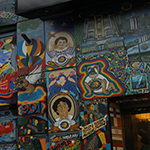Euroacademia Conferences
 Europe Inside-Out: Europe and Europeanness Exposed to Plural Observers (9th Edition) April 24 - 25, 2020
Europe Inside-Out: Europe and Europeanness Exposed to Plural Observers (9th Edition) April 24 - 25, 2020 Identities and Identifications: Politicized Uses of Collective Identities (9th Edition) June 12 - 13, 2020
Identities and Identifications: Politicized Uses of Collective Identities (9th Edition) June 12 - 13, 2020 8th Forum of Critical Studies: Asking Big Questions Again January 24 - 25, 2020
8th Forum of Critical Studies: Asking Big Questions Again January 24 - 25, 2020 Re-Inventing Eastern Europe (7th Edition) December 13 - 14, 2019
Re-Inventing Eastern Europe (7th Edition) December 13 - 14, 2019 The European Union and the Politicization of Europe (8th Edition) October 25 - 26, 2019
The European Union and the Politicization of Europe (8th Edition) October 25 - 26, 2019 Identities and Identifications: Politicized Uses of Collective Identities (8th Edition) June 28 - 29, 2019
Identities and Identifications: Politicized Uses of Collective Identities (8th Edition) June 28 - 29, 2019 The European Union and the Politicization of Europe (7th Edition) January 25 - 26, 2019
The European Union and the Politicization of Europe (7th Edition) January 25 - 26, 2019 7th Forum of Critical Studies: Asking Big Questions Again November 23 - 24, 2018
7th Forum of Critical Studies: Asking Big Questions Again November 23 - 24, 2018 Europe Inside-Out: Europe and Europeanness Exposed to Plural Observers (8th Edition) September 28 - 30, 2018
Europe Inside-Out: Europe and Europeanness Exposed to Plural Observers (8th Edition) September 28 - 30, 2018 Identities and Identifications: Politicized Uses of Collective Identities (7th Edition) June 14 - 15, 2018
Identities and Identifications: Politicized Uses of Collective Identities (7th Edition) June 14 - 15, 2018
“When You Go There You Become Someone Else, When You Come Here You Become Again Another Person; Wherever You Go You Are Nothing”: Exploring Identity at the ‘Borderlands’
-
-

-
Presentation speakers
- Eleni Konidari, University of East Anglia
Abstract:
How is (non) national belonging experienced by those who are living at ‘the borderlands’ of conflicting nationalisms? Back in 1923 the Treaty of Lausanne specified a forced population exchange and defined the borders between two nation- states at birth after mutual massacres; Greece and Turkey. However, the former Muslim Ottoman populations, which resided in Western Thrace have been exempted from the exchange; people whose language and religion were identified with the new nation state of Turkey after the territorial rearrangements became Greek citizens. Based on an ethnographic study I conducted in 2012/13 in Western Thrace and drawing on Gloria Anzadua’s (1987) understanding of ‘the borderlands’ I analyze how people from the Western Thrace minority community find themselves between what I term their ‘stepmother’ land Greece and their motherland Turkey, how they experience a double non belonging to both and how they ‘return home’ in the literal and metaphorical borderland of their community in Western Thrace. In the Balkans, national belonging tends to be expressed as either/or however, my research revealed that is not always experienced as such.
-
Related Presentations

Inequality, Elite Messaging and National Pride
- Matthew Eckel

















